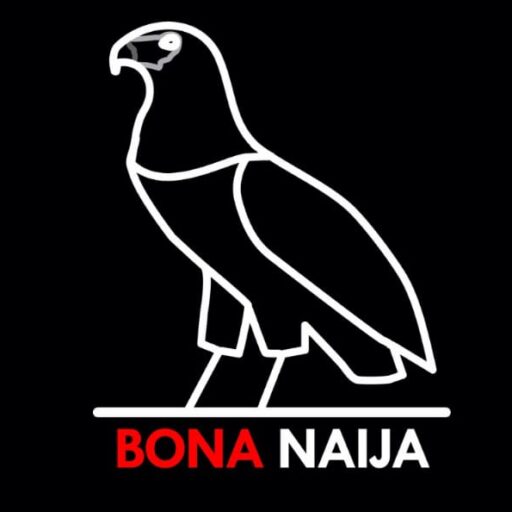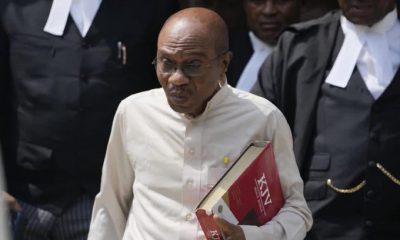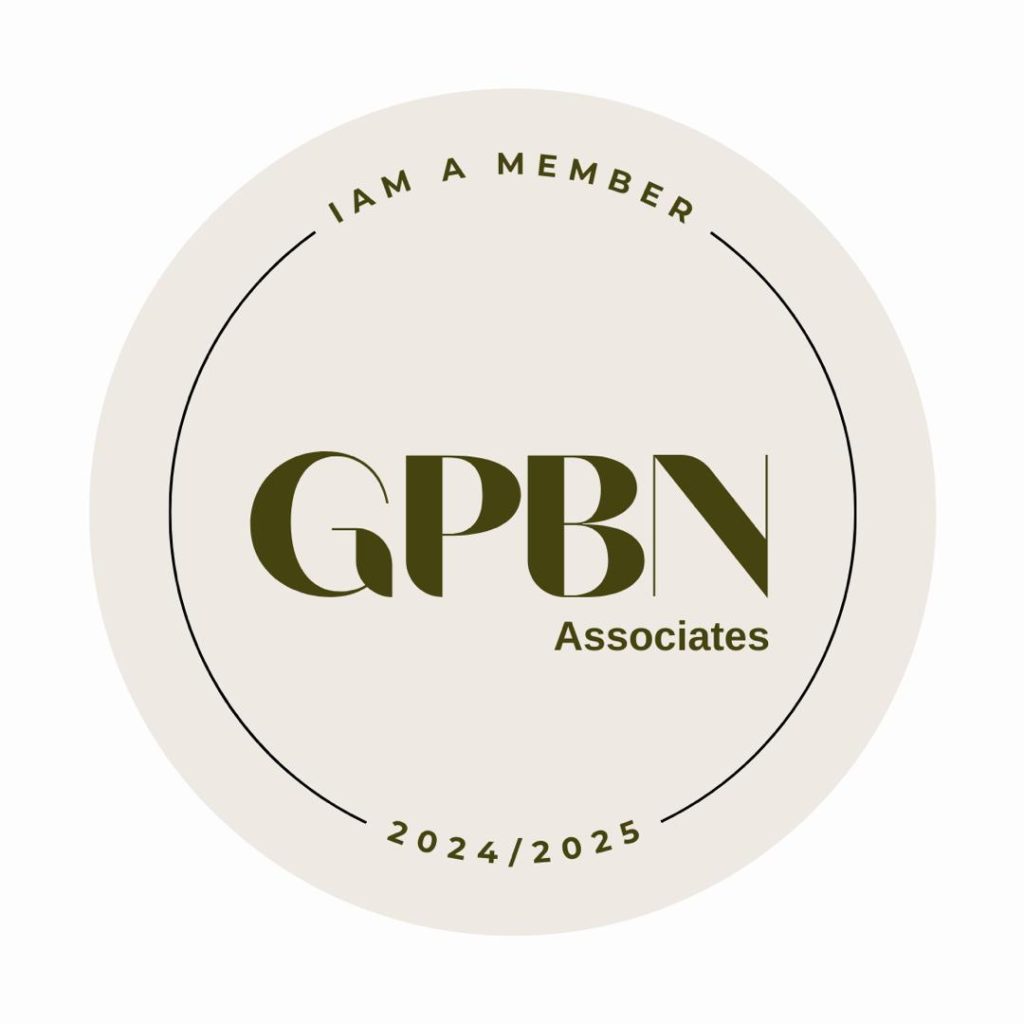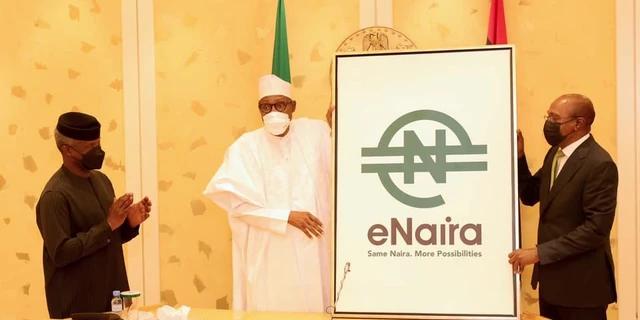

News
All you need to know as Buhari unveils CBN’s eNaira
The President, Major General Muhammadu Buhari (retd), on Monday, unveiled the Central Bank of Nigeria’s digital currency, also known eNaira, in a keynote event attended by top government functionaries at the State House, Abuja.
He said Nigeria’s Central Bank Digital Currency and its underlying blockchain technology could increase the nation’s Gross Domestic Product by $29bn over the next 10 years.
In his address, the President said the e-currency would help increase remittances, foster cross-border trade, improve financial inclusion, make monetary policy more effective, and enable the government to send direct payments to citizens eligible for specific welfare programmes.
According to him, the digital currency will help move many more people and businesses from the informal into the formal sector, thereby increasing the country’s tax base.
Buhari said, “In recent times, the use of physical cash in conducting business and making payments has been on the decline. This trend has been exacerbated by the onset of the COVID-19 pandemic and the resurgence of a new digital economy.
“Alongside these developments, businesses, households, and other economic agents have sought for new means of making payments in the new circumstances.”
Buhari lauded the CBN for coming up with the eNaira.
Central bank mints 500m eNaira, issues 200m to banks
On his part, the Governor, CBN, Godwin Emefiele, said since the eNaira platform went live, there had been overwhelming interest and encouraging response from Nigerians and other parties across the world with over 2.5 million daily visits to the website.
He said, “Thirty-three banks are fully integrated and live on the platform, N500m has been successfully minted by the bank, N200m has been issued to financial institutions, over 2,000 customers have been onboarded and over 120 merchants have successfully registered on the eNaira platform.”
The CBN governor also used the occasion to commend the President for “making history, yet again,” with the launch of the eNaira – the first in Africa and one of the earliest around the world.
Emefiele announced a new financial instrument titled, “The 100 for 100 PPP – Policy on Production and Productivity”, which he said would be domiciled in the Development Finance Department of the CBN under his direct supervision.
He explained that under this policy, the CBN would advertise, screen, scrutinise and financially support 100 targeted private sector companies in 100 days, beginning from November 1, 2021.
The event was attended by Vice-President Yemi Osinbajo; the Secretary to the Government of the Federation, Boss Mustapha; the Chief of Staff to the President, Prof. Ibrahim Gambari; members of the Federal Executive Council; top officials of the CBN and heads of relevant government agencies.
Transactions on eNaira platform free for 90 days – CBN
Meanwhile, the CBN disclosed that all transactions conducted on the newly-launched digital currency platform would be free for 90 days.
The regulator, however, stated that it would revert to its guide on applicable charges by banks and other financial and non-financial institutions at the end of the stated period.
The apex bank also said that Ministries, Departments and Agencies could make payments and collect revenues using the eNaira wallet.
The CBN disclosed this in the framework titled, ‘eNaira Circular and Guidelines’, which was later released on Monday.
The central bank guide read in part, “The charges for transactions that originate from the eNaira platform shall be free for the first 90 days commencing from October 25, 2021 and then revert to applicable charges as outlined in the Guide to Charges by Banks, Other Financial and Non-bank Financial Institutions. MDAs may collect revenues or make payments in eNaira.”
eNaira won’t change naira-dollar exchange rate – Experts
Meanwhile, economic and financial experts have said that the eNaira will not change or affect the value of the naira in the foreign exchange market.
They also expressed concern over the risk of cyber attacks on the eNaira accounts of Nigerians.
They spoke against the backdrop of the unveiling of the eNaira by the CBN.
The immediate past Director-General of the Lagos Chamber of Commerce and Industry, Dr. Muda Yusuf, said there was no relationship between foreign exchange market and the eNaira.
He said, “There is no connection between the eNaira and the exchange rate. No relationship at all. Exchange rate is determined by the demand and supply fundamentals in the foreign exchange market.
“These are driven largely by imports, exports and the flow of capital across borders. The naira, whether digital or physical, is just a means of exchange and to some extent, a store of value.”
He, however, noted that the eNaira was consistent with current digitalisation trend across all sectors globally.
Yusuf, who is the chief executive officer, Centre for the Promotion of Private Enterprises, explained that digital applications typically came with efficiency, cost effectiveness, smartness in usage and convenience.
“But it is still not clear what the value proposition of the eNaira is, beyond the psychological satisfaction of joining the league of countries with digital currencies,” Yusuf stated.
The CPPE boss noted that transactions on these platforms were already in trillions of naira, and still counting, adding that it remained to be seen what additional value the eNaira would bring.
He said, “A great deal of sensitisation and awareness need to be undertaken to generate trust and confidence in this new payment system initiative.
“International investors typically would prefer a currency that is acceptable globally and convertible such as the dollar.”
He observed that many Nigerians were still trying to understand what the eNaira really entailed. A financial analyst and Senior Lecturer at the Pan Atlantic University and a financial analyst, Dr Olalekan Aworinde, said there was a need to do more sensitise the public more on the risks.
He said, “I think that the CBN should be aware of the fact that there is the risk of cyber attacks with the introduction of the eNaira.
“As a result, the CBN needs to properly educate the masses on how to use the eNaira in a way that would not put their safety and the safety of their funds at risk.
Another expert and the Chief Executive Officer of SD&D Capital Management Limited, Mr Idakolo Gbolade, also said there was the need to sensitive the public the more.
How to use the eNaira:
What Is ENaira?
The eNaira will be a digital representative of the paper Naira currency issued by the Central Bank of Nigeria. It will also be a complementary legal tender in Nigeria, having the same exchange value as the Naira and maintaining a parity of value as the Naira. One interesting feature of the eNaira is that it will not earn any interest to the holder, and it is built on a blockchain open ledger technology. This simply implies that you cannot have a duplicate of eNaira or a fake version of it because each note will be unique.
How Safe Is The ENaira?
If it involves money, then safety is of paramount importance. The eNaira is designed to solve any verification risk by assuring all holders that each eNaira is a valid token. This authenticity is achieved by building the eNaira block chain that makes it difficult or impossible to change, hack, or cheat the system. Thus, every retailer is likely to accept the eNaira because it cannot be forged or duplicated.
How Do I Access The ENaira?
The CBN has planned a rollout in a tiered manner. First, it will issue the eNaira to financial institutions like banks. Your bank will then retail the eNaira to you. If your transaction value is less than N50,000 a day, you don’t need a bank account to get the eNaira; you can use a NIN verified phone number to buy eNaira. If you want to withdraw more than N50,000 but up to the daily limit of N1 million, you will need a BVN in addition to a verified phone number.
The CBN has very strict “Know Your Customers” protocols for this process. The aim is to assure all retailers of the safety and utility of the eNaira.
Why Should I Use ENaira?
The eNaira has a low-cost advantage. The daily transfers between accounts are at no cost to the holder of the account and lower transaction cost is a massive incentive, as traders will pay no fees for withdrawals and deposits to any bank account. Thus, there will be no transaction fees but improved financial safety.
How Will Dollar Remittance To ENaira Work?
The eNaira will be integrated into the CBN’s forex process, and this is to make it easier to receive remittances to Nigeria. These transfers could be from the CBN crediting eNaira directly to the international Money Transfer Organisation (IMTO). So a Nigerian abroad sending $100 to his uncle can debit his US bank account and credit $100 to an IMTO, who will buy eNaira from the corresponding bank in Nigeria. Then the $100 is converted to eNaira instantly, at a far lower transfer fee. This is a real benefit and a significant advantage the eNaira will provide to customers.
The Potential Of The ENaira
Any two parties who can credit a Nigerian banking institution with corresponding currency can use the eNaira. This means a trader banking with UBA in Burkina Faso can settle his import bills from the Gambia using eNaira. This will be the next level of the rollout for financial institutions to build out an ecosystem with eNaira as the base product.
Furthermore, the CBN outlines that eNaira will bring the vast majority of Nigerians who have no bank account but have a phone into the formal financial economy. The eNaira can also be used for salary payments and payments for goods and services. So an electrician can accept payment on his phone, store them in his wallet, and make transactions with any vendor.
What Are The Risks?
The eNaira is online, the BVN and NIN information is also online, so the risk of malicious actors attempting to hack or gain access to the data is very low. Even more, CBN has assured a more secured process with eNaira tokens. Overall, it appears to be a positive progression towards a cashless society, with lower costs and higher productivity for Nigerians.
News
16 Nigerian Military Officers Arrested Over Alleged Coup Plot to Oust President Tinubu
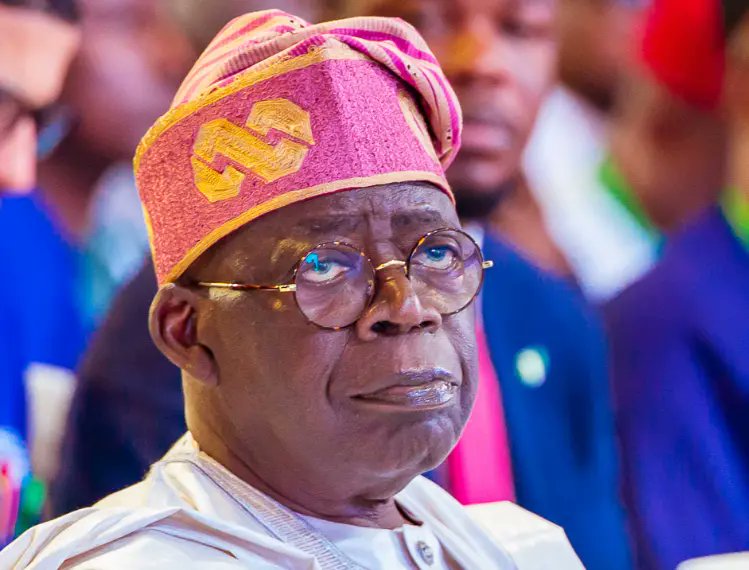
At least sixteen senior military officers have been arrested by the Nigerian Armed Forces over an alleged plot to overthrow President Bola Tinubu’s administration, according to top security sources.
According to Sahara Reporters Although the military publicly described the arrests as disciplinary actions linked to “failure in promotion examinations” and “career stagnation,” insiders told reporters the detained officers were accused of planning a coup d’état.
The Director of Defence Information, Brigadier General Tukur Gusau, confirmed the arrests but said they followed a “routine military exercise,” citing “indiscipline and breach of service regulations.”
However, intelligence gathered by the Defence Intelligence Agency (DIA) allegedly uncovered a plot led by a Brigadier General to “seize power from selfish politicians.” The officers, ranging from Captains to senior commanders, were reportedly picked up at various military formations across the country.
Sources added that the October 1 Independence Day parade was abruptly cancelled after authorities discovered the conspirators planned to strike during the ceremony, allegedly targeting the President and other top officials.
The detained officers are currently being held at the DIA facility in Abuja pending further investigation.
Nigeria has witnessed five successful coups since gaining independence in 1960. Analysts warn that rising reports of corruption, low morale, and political interference within the armed forces have continued to fuel discontent among some military personnel.
Follow BONA NAIJA for more
News
I will be receiving some notable figures from the ADC. – APC National Chair, Yilwatda.

Next week, I will be receiving some notable figures from the ADC. – APC National Chairman, Yilwatda.
Professor Nentawe Yilwatda, the National Chairman of the All Progressive Congress (APC), has announced that several politicians from opposing parties are planning to join the ruling APC soon.
During a meeting with Plateau APC stakeholders held at Crest Hotel in Jos yesterday, Yilwatda shared this.
He said, “Next week, I will be receiving some notable figures from the ADC.
“Some of those who had defected from PDP have reached out to ADC and are now returning to APC. Many of them have completed their ‘medicals’ and will be officially unveiled next week.
“In another two weeks, we will unveil yet another big figure who just finished his own ‘medicals.’
“He tried to unveil himself the day before yesterday, you probably saw it in the news. But officially, we’ll be receiving him soon. More people are coming. More senators are joining; more governors, more members of the National Assembly. The APC is the bride of the moment.
“Thank you so much for all you did—from the very beginning of my loss, through the burial, and even after.May God bless and reward you richly. I must also extend my deepest gratitude for how you stood your ground when we faced the setback at the Supreme Court.
“Many people thought that was the end of APC on the Plateau; that we had been buried politically. But what they didn’t see was the seed that had already been sown.
That seed germinated, and today, APC is stronger, more vibrant and growing bigger by the day.
“I’d also like to take this opportunity to warmly welcome our new members.”
Abia State
2027: Prepare Your Will If You Plan to Write Election Results in Abia — Governor Alex Otti Warns
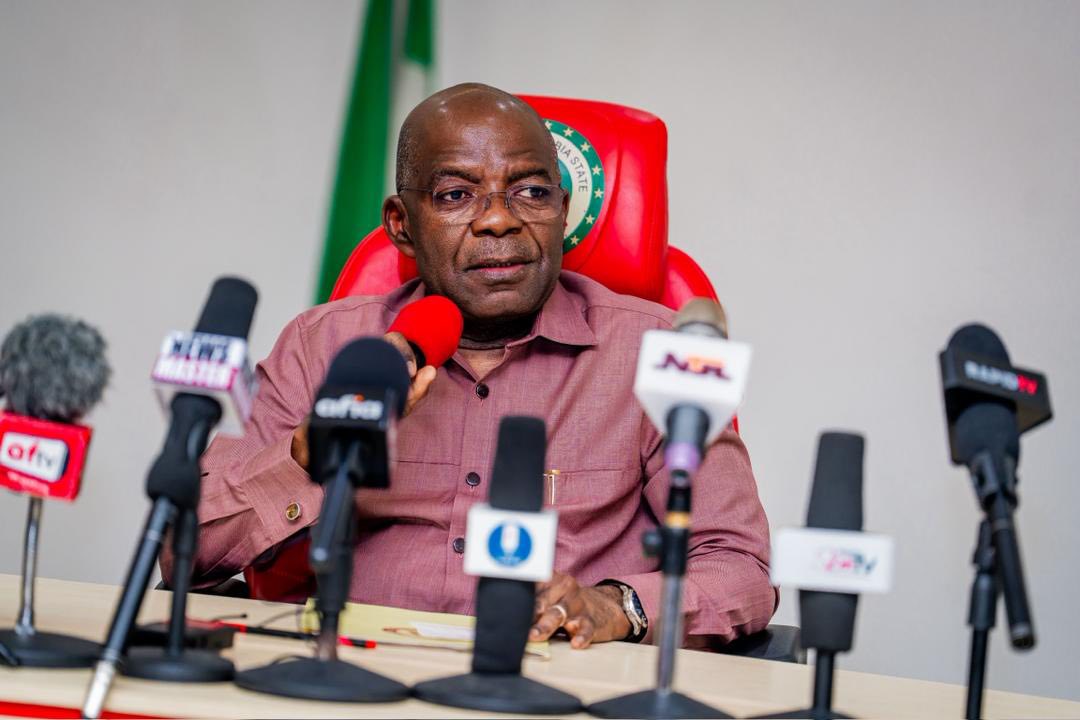
Abia State Governor, Dr. Alex Otti, has cautioned individuals plotting to manipulate the 2027 governorship election results to first “write their wills” before embarking on such a dangerous mission.
Speaking during his monthly media chat in Umuahia, the governor emphasized that his statement was not a threat but a caution informed by intelligence reports suggesting that some displaced politicians are boasting about plans to “write” election results in 2027.
“This is not a threat but a warning. If you are planning to write election results in Abia, please write your will first,” Otti declared.
He dismissed remarks attributed to the Deputy Speaker of the House of Representatives, Rt. Hon. Benjamin Kalu, noting that power ultimately belongs to God.
“I do not have the anointing to speak about what will happen in 2027 in 2025. But I know that power belongs to God, and He gives it to whom He wants. We should not speak when the Lord has not spoken,” he said.
Governor Otti advised Kalu to focus on his duties at the National Assembly, adding that there was no animosity between them despite the Deputy Speaker’s repeated public criticisms.
“My relationship with the Deputy Speaker didn’t start with politics. This is the second time he has publicly attacked my administration. I forgive him, but I think he suffers from what I call ‘Information Deficiency Syndrome.’”
He further clarified that according to the Protocol Act of 2000, the sixth position in Nigeria’s political hierarchy belongs to the Deputy Senate President, not the Deputy Speaker.
On Governance and Infrastructure
Governor Otti commended the Abia State Environmental Protection Agency (ASEPA) for its consistent efforts in maintaining a cleaner environment across Aba, Umuahia, and Ohafia.
“We are now moving to the next phase of waste management — recycling and turning waste into wealth,” he said, disclosing ongoing engagements with investors and institutions to actualize the plan.
The governor also announced progress in reviving key moribund industries, including Star Paper Mill, Aba Textile Mill, and Modern Ceramics, through collaborations with the Asset Management Corporation of Nigeria (AMCON) and other stakeholders.
“Government is an enabler. Our goal is to revive these industries, hand them to professionals to run as private entities, and create jobs for our people,” Otti stated.
Education and Health
Governor Otti reaffirmed his administration’s commitment to transforming the education sector, revealing that over 5,395 new teachers have been deployed across the state, with plans to recruit an additional 4,000 due to rising enrollment.
He also highlighted improvements in healthcare delivery, including the reconstruction of general hospitals and recruitment of over 774 healthcare professionals, with applicants coming even from other African countries.
“We are building a health system powered by renewable energy to ensure every community has access to quality healthcare,” he said.
Power and Infrastructure Expansion
Governor Otti announced the installation of nearly 8,000 solar-powered streetlights across the state and ongoing projects aimed at achieving steady electricity supply in Aba, Umuahia, Bende, and Ohafia.
“When Aba Power reaches its full capacity of 188 megawatts, excess power will be distributed to Umuahia and other parts of the state. Light brings development, and darkness disappears where there is light,” he said.
He disclosed that President Bola Tinubu’s representative, Senator Dave Umahi, recently commissioned eight newly completed roads in Abia, with more infrastructure projects including the 25km Umuahia–Ikot Ekpene Road and Ihechiowa Ring Road set to begin soon.
On Defection Rumours
Governor Otti debunked speculations about plans to defect to the All Progressives Congress (APC), stating that he remains committed to his principles.
“You don’t take decisions simply because others are taking them. We are not people who follow the crowd,” he affirmed.
Follow BONA NAIJA for more
News
American Accuses Reno Omokri of Deception, Calls Him “Pathological Liar” as Omokri Dismisses Christian Genocide Claims

A former Texas Mayor, Mike Arnold, has accused former Nigerian presidential aide Reno Omokri of deception and manipulation, describing him as a “pathological liar” who thrives on calculated deceit.
In a viral post on X (formerly Twitter), Arnold said he had witnessed Omokri’s alleged dishonesty firsthand during personal and professional encounters both in the United States and Nigeria.
“The truth about Reno Omokri is sad. I’ve seen it up close. Reno doesn’t lie like most liars. He lies calm, cool, constant. Up close, he’s reptilian. Chilling. Soulless. Yet so charming,” Arnold wrote.
Arnold, who claimed to have hosted Omokri in Texas and attended his birthday safari in Kenya, accused the former presidential aide of falsifying events, exaggerating connections, and fabricating ownership of luxury assets.
He recounted an incident where Omokri allegedly showcased luxury cars online, falsely claiming ownership of two vehicles belonging to Arnold’s friend.
Arnold also alleged that during a fact-finding mission to Nigeria on Christian persecution, Omokri promised high-level meetings with President Bola Tinubu, NSA Nuhu Ribadu, and the Sultan of Sokoto, none of which materialized.
“Looking back, those promises were props for his narrative for clout and manipulation,” he wrote.
Arnold further accused Omokri of misrepresenting him on Nigerian television, falsely introducing him as the current mayor of Blanco, Texas, and a close associate of U.S. Senator Ted Cruz.
“On live TV, he called me a Republican mayor—we don’t even have partisan municipal elections. He also said I’m a personal friend of Ted Cruz. False,” Arnold stated.
Quoting Psalm 101:7, Arnold said Omokri’s actions were “soulless” and “evil,” adding that “lying to cover up the Christian genocide raging in Nigeria is a bridge too far.”
“People must know Reno Omokri is a pathological, habitual, calculating, self-serving liar from someone who knows him personally so they won’t trust his sleazy attempts to bury the blood of tens of thousands of Nigerian martyrs with the manure spewing from his mouth,” Arnold wrote.
He also accused Omokri of harboring political ambitions, claiming that he plans to run for vice president under National Security Adviser Nuhu Ribadu.
Omokri, however, recently appeared on Arise News Night, dismissing reports of a Christian genocide in Nigeria as “ludicrous,” insisting that both Christians and Muslims are victims of insecurity across the country.
“Killings happen equally to Christians and Muslims,” Omokri said, urging Nigerians not to allow Western narratives to sow religious division.
The exchange has since sparked intense debate online, with many Nigerians weighing in on the authenticity of Arnold’s claims and Omokri’s controversial statements on religious persecution.
Follow BONA NAIJA for more
Biafra
BREAKING: Nnamdi Kanu’s Ailment Not Life-Threatening – Court Adopts NMA Findings

The Federal High Court in Abuja has adopted a medical report by a panel set up by the Nigerian Medical Association (NMA), which found that the detained leader of the Indigenous People of Biafra (IPOB), Nnamdi Kanu, is not suffering from any life-threatening ailment.
The NMA panel, constituted by the association’s president on the order of Justice James Omotosho, was tasked with determining Kanu’s actual health condition following conflicting claims from medical experts representing both the prosecution and the defence.
According to the report submitted to the court on October 13 by the prosecution team led by Adegboyega Awomolo (SAN), and partly read in open court on Thursday, the panel concluded that Kanu’s condition is not life-threatening and that he is fit to stand trial.
Justice Omotosho, citing the report and noting no objections from either side, ruled that the trial would proceed.
The judge subsequently granted the defence six consecutive days — from October 23 to October 28 — to open and close its case.
Additionally, the court approved an oral application by defence counsel, Kanu Agabi (SAN), requesting that Kanu’s legal team be allowed to hold private consultations with him outside the Department of State Services (DSS) facility to ensure confidentiality.
Justice Omotosho ruled that the private meeting will take place in the courtroom between 9 a.m. and 12 noon on October 22, with only Kanu and his lawyers present.
The court further ordered that Kanu should continue receiving medical care at the DSS medical facility pending further proceedings.
One of Kanu’s lawyers, Aloy Ejimakor, confirmed the development after Thursday’s sitting.
Follow BONA NAIJA for more
-

 Entertainment2 weeks ago
Entertainment2 weeks agoBig Brother Naija Live Update: KOLA, SULTANA Evicted #BBNaija
-

 Music3 weeks ago
Music3 weeks agoOdumodublvck Drops “Industry Machine” Feauturing Wizkid Ahead of 23-Track Album
-

 Entertainment2 weeks ago
Entertainment2 weeks agoImisi Crowned Winner of Big Brother Naija Season 10
-

 Biafra3 weeks ago
Biafra3 weeks agoJudgement Day: Tension in Abuja as Court Rules on Nnamdi Kanu’s No-Case Submission Today
-

 Music News2 weeks ago
Music News2 weeks agoOdumodublvck Set to Drop ‘Industry Machine’ The Album Featuring Davido, Wizkid, Skepta & Stormzy
-

 Music3 weeks ago
Music3 weeks agoSarz Drops Debut Album Featuring Wizkid, Asake, Skillibeng
-

 Music3 weeks ago
Music3 weeks agoSpyro Releases Debut Album The Men, The Boys & Your Guy
-

 News2 weeks ago
News2 weeks agoFirst Lady, Oluremi Tinubu Celebrates World Teachers’ Day 2025
-

 Music News3 weeks ago
Music News3 weeks agoNigerian singer Peruzzi to release new single “Die It” at midnight
-

 Entertainment3 weeks ago
Entertainment3 weeks agoVIDEO: AYRA STARR & REMA SHUT DOWN GLOBAL CITIZEN FESTIVAL 2025


